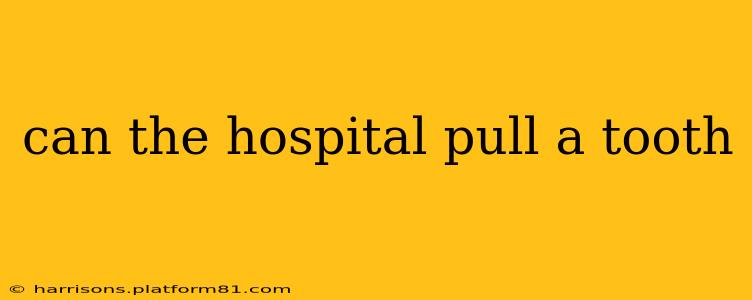Can the Hospital Pull a Tooth? Understanding Emergency Dental Care
The short answer is: sometimes, but usually not. While hospitals are equipped to handle medical emergencies, tooth extraction is generally outside their core competency. Hospitals typically focus on serious medical conditions requiring immediate attention, like heart attacks, strokes, or major trauma. However, there are specific circumstances where a hospital might extract a tooth. Let's break down the specifics.
When would a hospital extract a tooth?
This usually happens only in the context of a severe medical emergency intertwined with a dental problem. For example:
- Trauma: A significant facial injury causing a tooth to be severely damaged or dislodged might necessitate extraction in the emergency room. The priority is managing the overall trauma, and the tooth extraction becomes a part of stabilizing the patient.
- Infection Spreading: In cases of severe dental infection (abscess) that's spreading to surrounding tissues, causing a life-threatening condition like sepsis, a hospital might perform an emergency extraction to control the infection. This is a rare, but serious situation.
- Patients Undergoing Major Surgery: A patient undergoing a significant operation might have a tooth extracted preemptively if it poses a risk during the procedure. This is typically determined by the surgical team, often an oral surgeon.
Why don't hospitals typically pull teeth?
Hospitals lack the specialized equipment and trained personnel typically found in dental practices. Dental extractions, even simple ones, require specific tools, techniques, and expertise to ensure minimal pain and complications. Furthermore, hospitals prioritize resources for life-threatening emergencies, making routine dental procedures a low priority.
What should you do if you need a tooth extracted?
For routine tooth extractions or dental problems, you should always see a dentist or oral surgeon. They have the necessary training, tools, and infection control protocols to perform the procedure safely and effectively.
What if I have a severe dental emergency outside of normal dental office hours?
Seek immediate care from an emergency room. However, be prepared for the ER to focus primarily on addressing life-threatening aspects of your condition. They might provide temporary pain relief or antibiotics, but likely won't perform the extraction unless it's directly related to a serious medical emergency as described above. They'll likely refer you to a dentist or oral surgeon for the actual tooth extraction once the immediate threat is addressed.
What are the signs of a severe dental emergency requiring immediate medical attention?
- Severe pain and swelling: If the pain is unbearable and accompanied by significant swelling, seek immediate medical attention.
- High fever and chills: This could indicate a serious infection.
- Difficulty breathing or swallowing: This is a critical sign requiring immediate emergency care.
- Heavy bleeding that won't stop: This is another life-threatening symptom requiring immediate attention.
- Significant facial injury involving teeth: As mentioned earlier, trauma-related dental injuries require urgent medical attention.
In conclusion, while a hospital might extract a tooth in a limited set of life-threatening emergencies, it's not their usual practice. For routine dental care, including tooth extractions, always visit a qualified dentist or oral surgeon. Only seek emergency room care for genuinely life-threatening dental conditions.
